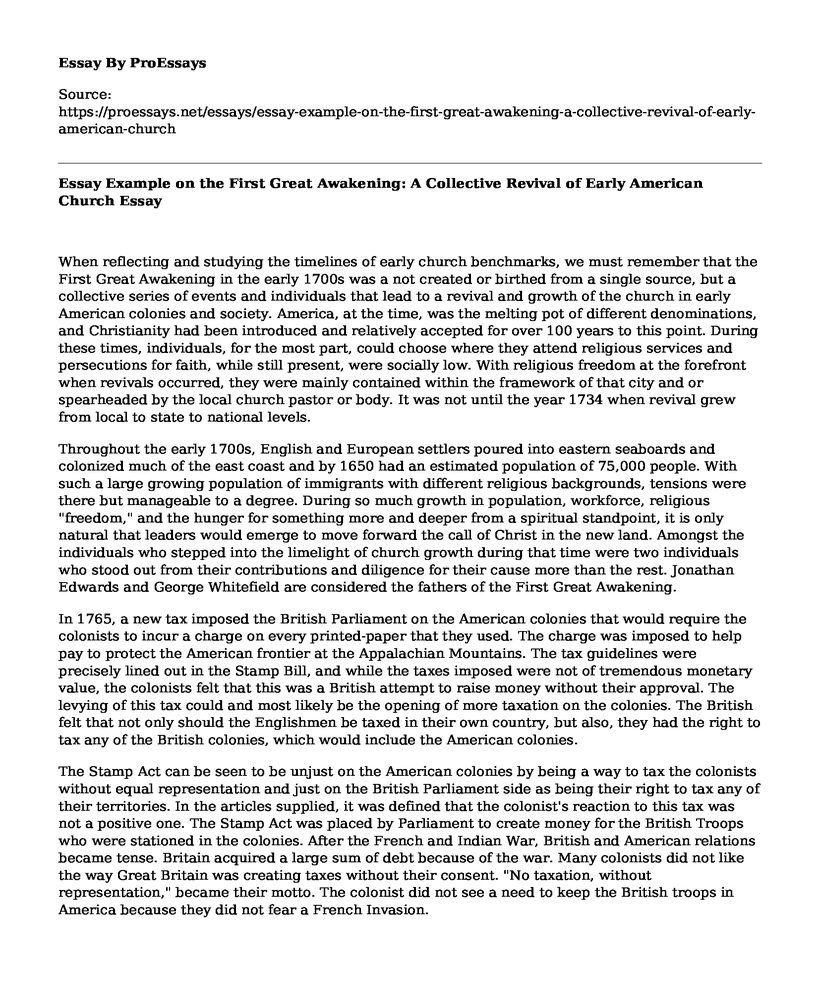When reflecting and studying the timelines of early church benchmarks, we must remember that the First Great Awakening in the early 1700s was a not created or birthed from a single source, but a collective series of events and individuals that lead to a revival and growth of the church in early American colonies and society. America, at the time, was the melting pot of different denominations, and Christianity had been introduced and relatively accepted for over 100 years to this point. During these times, individuals, for the most part, could choose where they attend religious services and persecutions for faith, while still present, were socially low. With religious freedom at the forefront when revivals occurred, they were mainly contained within the framework of that city and or spearheaded by the local church pastor or body. It was not until the year 1734 when revival grew from local to state to national levels.
Throughout the early 1700s, English and European settlers poured into eastern seaboards and colonized much of the east coast and by 1650 had an estimated population of 75,000 people. With such a large growing population of immigrants with different religious backgrounds, tensions were there but manageable to a degree. During so much growth in population, workforce, religious "freedom," and the hunger for something more and deeper from a spiritual standpoint, it is only natural that leaders would emerge to move forward the call of Christ in the new land. Amongst the individuals who stepped into the limelight of church growth during that time were two individuals who stood out from their contributions and diligence for their cause more than the rest. Jonathan Edwards and George Whitefield are considered the fathers of the First Great Awakening.
In 1765, a new tax imposed the British Parliament on the American colonies that would require the colonists to incur a charge on every printed-paper that they used. The charge was imposed to help pay to protect the American frontier at the Appalachian Mountains. The tax guidelines were precisely lined out in the Stamp Bill, and while the taxes imposed were not of tremendous monetary value, the colonists felt that this was a British attempt to raise money without their approval. The levying of this tax could and most likely be the opening of more taxation on the colonies. The British felt that not only should the Englishmen be taxed in their own country, but also, they had the right to tax any of the British colonies, which would include the American colonies.
The Stamp Act can be seen to be unjust on the American colonies by being a way to tax the colonists without equal representation and just on the British Parliament side as being their right to tax any of their territories. In the articles supplied, it was defined that the colonist's reaction to this tax was not a positive one. The Stamp Act was placed by Parliament to create money for the British Troops who were stationed in the colonies. After the French and Indian War, British and American relations became tense. Britain acquired a large sum of debt because of the war. Many colonists did not like the way Great Britain was creating taxes without their consent. "No taxation, without representation," became their motto. The colonist did not see a need to keep the British troops in America because they did not fear a French Invasion.
Reference List
Gill, Anthony. "A Great Academic Re-awakening: The Return to a Political Economy of Religion." In Advances in the Economics of Religion, pp. 361-376. Palgrave Macmillan, Cham, 2019.
Wagner, Ryan L. "The Stamp Act: Revolutionary Resistance in New York." (2018).
Wilkerson III, DeWitt C. "Dentistry's Great Awakening." Cranio: the journal of craniomandibular practice 36, no. 3 (2018): 139.
Cite this page
Essay Example on the First Great Awakening: A Collective Revival of Early American Church. (2023, Apr 08). Retrieved from https://proessays.net/essays/essay-example-on-the-first-great-awakening-a-collective-revival-of-early-american-church
If you are the original author of this essay and no longer wish to have it published on the ProEssays website, please click below to request its removal:
- Research Paper on Dependence Between the Budget and Immigration in US
- Environmental Law Assessment in Canada Essay Eaxample
- Study on Professional Psychology in Nigeria: Voluntary Participation
- Essay on Japan's Non-Acquisition of Nuclear Weapons: A Look at Historic Conventions
- Essay Example on Youth Arrests in America: 95% Non-Violent, But Records Remain
- Jewish American Identity in the 21st Century: An In-Depth Look - Essay Sample
- Essay Example on Mexican American: My Cultural Identity Journey in Shaping My Personality







